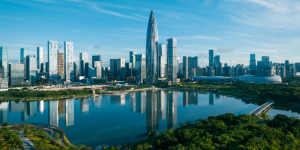
The United Arab Emirates is looking to become a hub for creativity in the coming years and is letting no stone unturned. Dubai, the most popular Emirate, recently launched a cultural visa which is valid for ten years!
The Dubai Creative Economy Strategy aims at doubling the number of creative companies in the United Arab Emirates in the next five years, from 8,000 to nearly 15,000. Despite the global health crisis, which resulted in an expat exodus in the Middle East, the country keeps on implementing new strategies to attract international talent. So this program will not only generate more jobs but will also help creative businesses to expand. The number of foreign professionals in the creative sector could rise from 70,000 to at least 150,000.
Between the Golden Visa and the Creative Visa Scheme
In March 2021, Dubai announced 1,000 visas for artists and creative profiles from all over the world. This program is the result of a cultural visa initiative launched in 2019. Hundreds of applications from candidates from 46 different countries have already been submitted. More than a hundred requests have already been approved. This program includes various creative industry sectors, including publishing, audiovisual, printing, cinema, music, video games, etc. Selected applicants are eligible for a ten-year visa.
In February, Abu Dhabi also launched a creative visa for foreign professionals with skills in areas such as heritage, performance arts, visual arts, design, media and publishing, online games and sports, etc.
Other countries that value creative artists
The United Arab Emirates are not the only country to value creative artists. Germany is another welcoming country, offering a work permit to freelance artists. However, the freelancers have to provide proof of funds to support their entire stay. But Berlin seems to be the best German city for freelance expat artists.
Holders of Australian, American, Canadian, New Zealand, South Korean, Japanese and Israeli passports are eligible for a special resident permit. The artist visa is a subcategory of the freelance visa. However, it is only available in Berlin. Elsewhere in Germany, artists can only obtain a freelance visa. But applicants must have proof of residence in Berlin, that is, the Anmeldung. They must also provide evidence of their artistic career, such as a complete CV, contracts or letters of intent issued by clients or collaborators, a list of all the projects they have participated in, etc. It's worth noting that even musicians, DJs, dancers and photographers are considered artists in Berlin and may be eligible for this permit.
Germany is not the only European country to offer this type of visa. Even though it is no longer part of the EU, the UK introduced the Global Talent Visa, a substitute for the Exceptional Talent Visa (Tier 1). It is intended for third-country nationals who have a proven track record in fields such as the combined arts, dance, theatre, music, literature, visual arts, media and film industry, fashion and architecture, etc. The Global Talent Visa is valid for up to 5 years and allows you to be either employed or the director of a company or self-employed. Your dependents can also accompany you if they are eligible. Another perk of this visa is that there are no minimum income and language requirements for candidates.
Canada is another promise land for expatriates, so it comes as no surprise that it offers an artist visa too. The federal program allows freelancers having a proven track record at the highest level in their country or internationally in the fields of arts, culture and sport, to apply for permanent residency in Canada. However, they must provide proof of their experience and guarantee that they will remain self-employed. Videographers, freelance journalists, music teachers, choreographers, painters, athletes and sports coaches, etc., are also eligible for this visa. The Canadian government relies on the contribution of these professionals for the development of culture and sports.
How about trying your luck in Japan? This country also offers artist visas to musicians, writers, painters, composers, and even sculptors, among many others. However, applicants must prove that they will be able to generate income through their activity in Japan to support themselves throughout their stay. They also need to provide evidence of their skills and experience in the specified field, including a portfolio, recommendation letters, critical reviews, or other relevant material. Note that this visa has a validity of 3 months to 5 years.
But Japan is not the only Asian country to offer this type of visa. In South Korea, you can get the E-6 Culture and Arts visa. This visa is intended for expatriates interested in art, music, dance, cinema, theatre, fashion, sports, etc. To be eligible, applicants must provide evidence of their skills and experience in the targeted field and letters of recommendation. However, this visa is only valid for six months.
So if you've always dreamed of having an artist career abroad, these tips can you to get started.



















